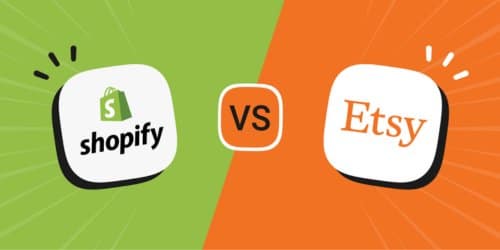Shopify vs Etsy — which is best for you? In this comparison, we walk you through the key features, pros and cons, and fees of these two well-known selling platforms, Shopify vs Etsy — and help you choose the right one for your e-commerce business. We will also compare some other popular brands like Shopify vs Etsy vs Squarespace, and Shopify vs Etsy vs Wix. Let’s get to it!
Etsy vs. Shopify: At a Glance
Shopify and Etsy both offer an e-commerce platform through which store owners can sell goods and services. The primary distinction between the two is that Shopify allows users to design their own branded environment, whereas Etsy is a marketplace. Although Etsy is most known for its handmade goods, many sellers also resale vintage apparel, crafting tools, and other one-of-a-kind items. Users of Shopify can offer handmade crafts, clothing, jewelry, and a variety of other products.
Shopify vs. Etsy: How They Stack Up
Now that you have a better understanding of both platforms, let’s see how they compare in terms of features, pricing, and other factors.
#1. Ease of Use
To succeed on Etsy or Shopify, you don’t need years of experience designing websites or coding checkout pages. For new entrepreneurs, both platforms are straightforward to use.
Shopify includes everything you need to get started attracting buyers right away. You may create an appealing website with access to stunning themes, modify your store with plugins, and even have access to helpful articles to aid you along the way.
Shopify will guide you through the majority of the building process, including suggestions on how to use the drag-and-drop builder and access to customer assistance when needed. The interface is also extremely clean and user-friendly.
For your online store, Etsy takes a somewhat different approach than Shopify. Instead of starting from scratch, you’ll use Esty to construct a storefront on an existing marketplace. This implies that many entrepreneurs will be able to get started with Etsy much more quickly. However, you don’t have as many design and branding alternatives.
Etsy will walk you through each step of the process so you can start selling as soon as possible. The tailored advice provided as you progress through the building process is ideal for beginners.
Both systems are equally simple to use for new store owners.
#2. Branding and Design
Creating a memorable brand image is an important part of growing a successful internet business. You want your customers to instantly know you and your offerings.
Shopify users will have no trouble creating a fantastic website. There are many of stunning themes to select from, so you can get started designing right away, even if you don’t know anything about coding.
Users can also bypass the themes and design from scratch if they like. You receive an easy drag-and-drop builder that makes adding additional functionality and branding to your website a breeze. You can change the colors to suit your company, add your own logo, and customize the layout of various sections of your website.
The beautiful thing about Etsy themes is that many of them are tailored to specific industries. This means you’ll get extremely relevant designs as well as added features tailored to your specific niche.
However, there aren’t nearly as many choices for brand creation and customisation on Etsy. If you create a conventional Etsy storefront, you can add your personalized logo to the page, but that’s about it.
#3. Domains and URL
Customers will remember you by your domain name. A good URL may do wonders for the SEO of your website.
Shopify allows store owners to acquire a domain name with their store, and you get free, limitless customisation and control as part of the package. You can select the best name for you and pay an annual cost for hosting. Shopify offers free domain hosting as well as an unlimited number of subdirectories and subdomains. You’ll be able to create an email address for your new domain as well.
Unfortunately, Etsy does not allow you to have your own domain. The only option to get a domain with Etsy is to buy the Pattern by Etsy product and use it to create your own website. Unfortunately, this means you won’t be able to take advantage of Etsy’s marketplace features.
#4. E-commerce Features
Probably the most significant factor to consider while deciding between Etsy and Shopify. The ideal solution should make it simpler to sell to your target demographic.
Shopify is a versatile platform well-known for its extensive sales tools. You’ll be able to build personalized product pages, distinct checkout experiences, and even offer your customers a variety of payment choices as soon as you set up your site. To keep stores safe, free SSL certificates are provided as a standard.
Shopify allows for quick and easy online selling, with an inventory and sales area to help you track your business’s growth. Third-party sales solutions can also be linked to your Shopify store.
Etsy enables business owners to begin selling immediately from a ready-made platform. The Etsy app allows you to handle sales and store requests while on the go, as well as track your inventory via the Etsy user interface.Gift cards and discount codes are among the many solutions available to help you increase your sales.
#5. Marketing Your Store
One of the most difficult difficulties for business owners nowadays is getting clients to their establishments. Fortunately, both Shopify and Etsy include tools to assist you in growing your business.
Shopify includes content marketing and SEO capabilities by default. You can start a blog on Shopify and use SEO capabilities to optimize meta descriptions, title tags, and item details to help customers locate your products.
Shopify also allows you to connect your store to a variety of marketing tools. You may create cross-channel social media promotion tactics and persuade clients to sign up for email newsletters.
Etsy, on the other hand, does not provide any methods for broadening your reach. There are several tutorials on Etsy to help you with SEO and marketing, but you must develop your campaigns on your own. Unless you choose the Pattern by Etsy solution, there are no built-in marketing options.
Pattern by Etsy includes social selling and email marketing features.
#6. Customer Support
Customer service is a key factor to consider while developing your online store. You must guarantee that you have a backup in case something goes wrong.
Shopify provides live chat and phone support 24 hours a day, seven days a week, making it simple to receive answers to your questions. You can contact us via social media or email. If you prefer self-help support, you can also use resources like as the Shopify community forums, help articles, and video tutorials.
Etsy also provides adequate customer service. You get 24/7 live chat with a human advisor, just like Shopify. There aren’t as many ways to contact Etsy support advisers as there are with Shopify.
Shopify vs. Etsy Fees
When it comes to Shopify vs Etsy, the less you pay on transaction fees and other charges as an online business, the better.
Shopify charges a monthly subscription fee as well as a transaction cost for payment processing (unless you utilize Shopify Payments).
Transaction costs begin around 2.9% plus 30 cents. However, more expensive bundles include a slight transaction reduction. Monthly plans include the following:
- Basic Shopify: Basic Shopify is $39 per month and includes unlimited product listings, 24/7 support, numerous sales channels, and your SSL certificate.
- Shopify: $105 per month for all Basic features plus up to 5 staff accounts, inventory locations, a transaction fee discount, and standard reports.
- Advanced Shopify: $399 per month includes all Shopify features, as well as up to 15 staff accounts, comprehensive reports, and third-party calculated shipping rates.
For $9 per month, you can also utilize “Shopify Lite” to add a shopping button to an existing store. Shopify Plus, on the other hand, is available at a bespoke fee for firms selling in large quantities.
Etsy does not charge anything to open an account, but you will incur charges when you fill out your store and begin selling. Costs, for example, include:
- Processing fees: 3% of the total transaction plus $0.25 for each purchase
- Transaction fees: 5% of the total charge, including shipping fees
- Listing fees: $0.20 for each item listed.
If you make a lot of sales on Etsy, it might quickly get expensive. While Etsy stores have lower initial startup expenses, Shopify may be more cost-effective as your sales volume develops.
What Can You Sell on Etsy and Shopify?
Both Etsy and Shopify have advantages and disadvantages, and which one you should use depends on your requirements.
Shopify is a wonderful option for businesses of all sizes since it provides a flexible platform with a variety of features. Shopify allows you to sell everything, from digital products and services like consultations, event tickets, online courses, and workshops to tangible products like dog toys and treats and automobiles. The entire shebang.
While Etsy is great for people selling one-of-a-kind items since it has a built-in audience of shoppers shopping for those kinds of items. Etsy caters to vendors that sell homemade and vintage items. As a result, the product selection available on this eCommerce site is quite limited.
Shopify and Etsy alternatives
When it comes to alternatives to Shopify, there’s no shortage of e-commerce platforms available that claim to offer similar selling functionality. Let’s look at a brief comparison of these alternatives including Shopify vs Etsy vs Squarespace, Shopify vs Etsy vs Wix, and Shopify vs Squarespace.
Shopify vs Etsy vs Squarespace
It is important to understand the main differences between these three e-commerce platforms, Shopify vs Etsy vs Squarespace, before making a decision. All three Shopify vs Etsy vs Squarespace, offer unique value to different types of sellers.
Check out Etsy if you want to sell handcrafted things but don’t want the effort of building a complicated internet store. However, if you want to develop a spotless website, one of Squarespace’s lower options will provide greater value for money than Etsy Pattern.
However, Shopify offers the most to offer serious online businesses interested in developing their online store for optimum profitability.
Shopify vs Etsy vs Wix
The main differences between Shopify vs Etsy vs Wix are:
Shopify is great for entrepreneurs looking to build a flexible and scalable online store with a plethora of apps and integrations.
Etsy is ideal for sellers of handmade, vintage, and creative supplies who want to take advantage of a dedicated platform and a friendly community.
Wix is appropriate for anyone looking for a website-building solution with e-commerce functionality since it provides significant flexibility and customization via its visual editor.
You’re better able to choose the proper e-commerce platform for your business now that you’ve gained a greater grasp of the essential features, associated prices, and benefits of Shopify vs. Etsy vs. Wix.
Squarespace vs. Shopify
We know it’s hard to pick the right website builder for your online store. But when it comes to Shopify vs Squarespace, the solution is simple: it really boils down to what you’re looking for.
Choosing an e-commerce website builder is mostly determined by the type of store you want to create. When it comes to business tools and selling options, Shopify is far more complete. Its primary goal is to assist your firm in growing.
However, if you don’t require such a sophisticated platform and are only looking to sell a few goods, Squarespace is an excellent choice.
How Is Etsy Different From Shopify?
The primary distinction between the two is that Shopify allows users to design their own branded environment, whereas Etsy is a marketplace. Although Etsy is most known for its handmade goods, many sellers also resale vintage apparel, crafting tools, and other one-of-a-kind items.
Is Shopify or Etsy Better to Sell?
Shopify is a little more technical than Etsy, but given its wealth of powerful e-commerce features, it is surprisingly user-friendly.
Is It Better to Start On Shopify or Etsy?
If you’re new to selling and don’t currently have a consumer base, sell handmade goods or artisan services on Etsy. Shopify is ideal for retail businesses who already have a consumer base.
Is Shopify Less Expensive Than Etsy?
You’ll pay $29 for your Shopify subscription + $5.85 in payment processing costs, for a total of $34.80. Etsy is less expensive.
Should I Use Both Etsy and Shopify?
Technically, yes. Simply set up a new account with a different email address than your current Etsy shop.
What’s the Main Reason for Using Shopify Over Etsy?
The primary distinction between the two is that Shopify allows users to design their own branded environment, whereas Etsy is a marketplace. Although Etsy is most known for its handmade goods, many sellers also resale vintage apparel, crafting tools, and other one-of-a-kind items.
What’s the Main Reason for Using Etsy Over Shopify?
You’ll be tethered to Etsy’s platform, which means less labor upfront but higher transaction fees.
Conclusion
That’s all there is to it! A comprehensive analysis of what you should know about Shopify vs Etsy before deciding on an eCommerce platform. Shopify could be the ideal platform for you if you’re searching for an easy way to start selling online or are serious about growing a business. Even though it’s simple to use, having a successful online store takes time and effort.
Related Articles
- WEBSITES TO SELL STUFF: FREE ONLINE MARKETPLACE 2023
- ETSY SHOP MANAGER: What It Is and How to Use It for Beginners 2023
- 51+ ETSY SHOP IDEAS To Consider In 2023
- BEST ETSY BLACK FRIDAY SALES IN 2023
- HOW TO START AN ETSY BUSINESS






